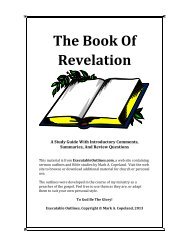The Epistle To The Hebrews - Executable Outlines
The Epistle To The Hebrews - Executable Outlines
The Epistle To The Hebrews - Executable Outlines
You also want an ePaper? Increase the reach of your titles
YUMPU automatically turns print PDFs into web optimized ePapers that Google loves.
INTRODUCTION<br />
<strong>The</strong> Superiority Of Christ's Priesthood<br />
<strong>Hebrews</strong> 7:20-28<br />
Mark A. Copeland<br />
1. In the first seven chapters of <strong>The</strong> <strong>Epistle</strong> <strong>To</strong> <strong>The</strong> <strong>Hebrews</strong>, the main thought is the superiority of<br />
Christ...<br />
a. <strong>To</strong> the prophets - He 1:1-3<br />
b. <strong>To</strong> angels - He 1:4-2:18<br />
c. <strong>To</strong> Moses - He 3:1-5<br />
d. <strong>To</strong> Aaron and his Levitical priesthood - He 5:1-10; 7:1-28<br />
2. In showing the superiority of Jesus’ priesthood, the author has done so step-by-step...<br />
a. Jesus is qualified to be a priest by virtue of His calling by God and His suffering - He 5:1-8<br />
b. He has been called to be “a priest forever according to the order of Melchizedek” - He 5:9-10<br />
c. <strong>The</strong> priestly order of Melchizedek is shown to be superior by comparing Abraham and<br />
Melchizedek - He 7:1-10<br />
d. That Christ has become such a priest has several implications - He 7:11-19<br />
1) <strong>The</strong> Levitical priesthood could not make one perfect before God<br />
2) <strong>The</strong> Law upon which the Levitical priesthood was based has been annulled<br />
3) Christ now provides “a better hope, through which we draw near to God”<br />
3. This brings us to He 7:20-28, in which we find a climatic comparison...<br />
a. Where Jesus is contrasted with those who served in the Levitical priesthood<br />
b. Where “<strong>The</strong> Superiority Of Christ’s Priesthood” is clearly demonstrated<br />
[In this passage, we find at least four points illustrating Jesus’ superiority, the first of which pertains<br />
to...]<br />
I. HIS DIVINE APPOINTMENT (20-22)<br />
A. LEVITICAL PRIESTS WERE APPOINTED BY A “COMMAND”...<br />
1. Beginning with Aaron, he and his descendants served in the Levitical priesthood<br />
2. It was a divine command that so appointed them - cf. Exo 28:1-4<br />
3. While divinely commanded, it was not with an oath<br />
A. JESUS WAS MADE A PRIEST WITH AN “OATH”...<br />
1. Again, the reference is to Psa 110:4, in which God swore an oath concerning the<br />
coming Messiah and His priesthood<br />
2. We saw earlier that a promise joined with an oath really confirms the “immutability”<br />
(unchangeableness) of God’s counsel - cf. He 6:17<br />
2. Appointed by an oath and not just a command, Jesus has become “a surety of a better<br />
covenant”...<br />
a. “Surety” means “guarantor” (NEB)<br />
b. Appointed by such an oath from God, Jesus guarantees the new covenant, that it is<br />
“better” (there is that key word again!)<br />
Sermons From <strong>Hebrews</strong> 57

















